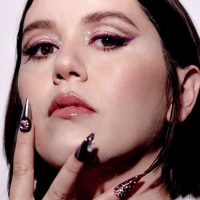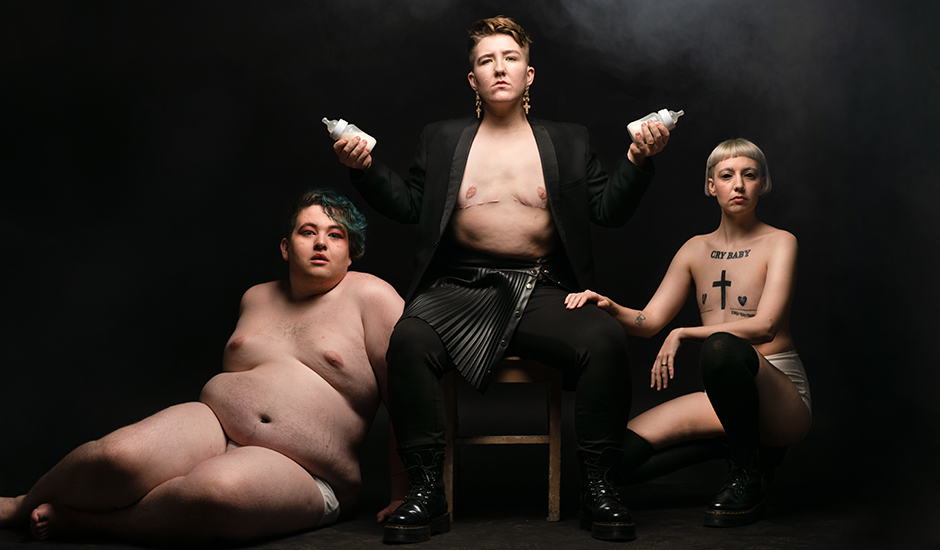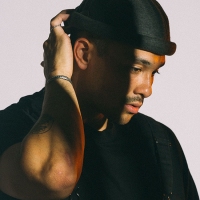 Listen to What You Like, a pacing new single from dance music experimentalist Logic1000Featuring Malaysian/Irish musician yunè pinku, the single comes with the announcement of Logic1000's next EP, In The Sweetness Of You.
Listen to What You Like, a pacing new single from dance music experimentalist Logic1000Featuring Malaysian/Irish musician yunè pinku, the single comes with the announcement of Logic1000's next EP, In The Sweetness Of You.

EP Walkthrough: Alter Boy break down the power of their debut EP, Act of God
On their debut EP, the Perth-based band step onto the plate as a shining light for queer, hard-of-hearing musicians around the world.
There's a lot of things incredibly powerful about Alter Boy, the Perth-based band that over the last two years, have become a heralding act of West Australian music. On the surface level, they're making attention-capturing electro-pop that swing between textures and sounds without losing the charm and experimentalism crucial to Alter Boy's sonic core. Beyond that, however, they're a tall-standing beacon of visibility; the band comprised of three queer-identifying, deaf/hard-of-hearing band members that since their entrance, have aided in making the Perth live music community more accessible and inclusive than it has ever been.
It has been an incredible delight to watch over the last few years. Their three introductory singles in 2019 - Frankenstein's Dream, Love Machine and Old Love - welcoming their versatile sound and stark songwriting to the centre stage. Last year, their two-peat of Glitter and Bad Dream Break In elevated them to a national scale, capturing wider attention as the Alter Boy story began to spread its wings on the east coast, taking their essential messaging and incredible music with them.
Now, in 2021, Alter Boy have their sights on their debut EP Act of God - an incredibly powerful six-track release that continues to elevate Alter Boy and their story. It's an EP that aims to break down even the very concepts of musicianship, building upon the contrast of sound and silence to create art that connects to everyone, instead of those only capable of full hearing. Within it, the band pose an important question - one that hasn't been asked before: "Does your industry definition of music still exist if we as deaf/hard-of-hearing people can’t hear it or experience it in the same way?"
It's a question deciphered across the course of Act of God. Lead vocalist Molly/Aaron leads the way, sharing messages on disability, community, queerness and religion as AUSLAN signers Jack Meakins and Laura Bullock support them, translating every rhythm and every lyric into AUSLAN as to better communicate the EP to the audience it aims to uplift and emphasise. They question the very fibres of music within the EP's confines, in a way that emphasises the imbalance of accessibility within the music industry - especially to those hard-of-hearing that often, are completely excluded from art.
In Death We Wed is one of the most obvious and striking examples within the EP, using a mix of audio and visual to communicate between worlds and tackle the accessibility of music, highlighting those that are often excluded from its appreciation and wealth. Slay King is another powerful moment, encapsulating everything Alter Boy strives for within a single, dark-brooding song. "'All your friends are having babies, you’re doing the same sh*t’ signifies the feeling of being left behind by a generation of friends and acquaintances who are following a more typical trajectory," says Molly/Aaron. "The feeling of being left behind is common to queer and disabled people who often enter second adolescence or don’t meet the typical milestones of adulthood."
Act of God is an incredible EP, in so many ways. For those with full hearing, the EP nestles into your brain with earworming hooks and striking boldness, placing questions and thoughts in there as you become infatuated with Alter Boy's sound. For those hard of hearing and deaf - for those that can't typically interact with music due to their disability - Act of God is a moment of power, one that gives art back to those that have been long excluded and encourages others to think in the same way.
There's something remarkable about that, and there's something remarkable in Alter Boy full-stop. Act of God shows that, and as their debut EP, it's perhaps the best they could've asked for. Take a dive into the EP below, alongside a track-by-track walkthrough from the band which details the EP's meaning and creation one song at a time.
We’re here to mess with the traditional definition of music. Who’s to say music can’t be silent? Who’s to say music needs to exist at all? It can be entirely hypothetical. Music can be a conversation. Watch us upload two minutes of silence to all of your major music platforms and call it a song. Watch us upload a silent film and call it a music video.
We want to exhibit our songs in alternative and contradictory forms and even insist upon the existence of songs that can’t be perceived. Does your industry definition of music still exist if we as deaf/hard-of-hearing people can’t hear it or experience it in the same way?
The traditional discourse about music and song is limiting. For us, music is fluid. It can change from person to person. It can change when we put our hearing aids/cochlea on or when we take them off. Music can be accessible to people who cannot hear, and it can be inaccessible to people who can hear. The songs on our EP, those with and without sound, are equal in value. Sound isn’t better than silence. Hearing isn’t better than deaf.
We want to give some power back to deaf/hard-of-hearing communities, but we also want to see the music industry learn and grow with us.
1. Slay King
This track is perhaps our most ailing creation to date. It consists of a dark pop track and Auslan music video and is the culmination of the struggle behind the art. When people see Alter Boy on stage or online, they might perceive us as overcoming our disabilities. We’re not overcoming disability; we’re performing and creating with disability. Our audience is not present to witness the barriers to access. The struggle to get out of bed. The doctors and the medicines and the audiologists and the systemic hurdles and the exhaustion and the grief. We want to share those parts of ourselves as much as we want to celebrate our art with our audience. Disabled people have to work so much harder to get noticed in this industry, often with fewer resources and fewer hours in the day, and the public needs to recognise this.
2. Act Of God
This song is about late access to language and community. Many of us did not have access to our community, language, and culture growing up because we were actively denied awareness and forcefully assimilated into the hearing world as a result of an ableist system, or we become deaf later in life. When we finally find our community, we struggle to recognise ourselves as belonging to the deaf world or the hearing world, and we get stuck somewhere in the middle. The song is about finding community. The Auslan music video is a representation of how Jack uses Auslan. It is his raw interpretation. We are here to remind those who are disconnected from community, culture, or language, that their experiences should not be erased, minimised, or debated. Between worlds. Within worlds. We belong here. You belong here.
3. Die For Me
This song is a synth wave meets electronic house track, which exemplifies an amusingly erotic relationship between Jesus and his followers. In this case, Jesus is a hot butch trans lesbian. We’re taking back some of our power from fundamentalist Christianity, but we’re also here to celebrate butchness. Butches are hot and should be compared to our lord and saviour.
4. Follow Along As Best You Can
This song is a good time for hearing people. We don’t want to spoil it so go and have a listen for yourself.
5. In Death We Wed
We intended to use this song to create a stark contrast between sound and silence. Hearing people can choose to listen to the sound component, and Auslan users with vision can choose to watch the film component. Others can visit the lyrics or have a conversation about what it is like to navigate the space between worlds or beyond worlds. Between deaf and hearing, and deafblind too. We hope to make this conversation as impactful if not more impactful than the work itself. It is a much broader conversation about who gets to access music and how.
The story itself is about gay lovers of Greek Mythology, Achilles and Patroclus; two young men who go to war to win their immortality. Laura and I are big fans of Greek mythology so this is a love song dedicated to them. The repeated lyric and title In Death We Wed is a nod to current marriage equality law, which fails to extend to disabled people, who lose their disability support if legally wedded. Laura and I are engaged, but we want to make it clear that we are not able to legally marry as a result of an ableist system.
6. I Can’t Hear This Note
I Can't Hear This Note is a track is inspired by the realisation that there are probably lots of elements to our songs that I can’t hear. Nothing in the world is fully accessible to everybody, and the idea that my music might not be accessible to me is just so exciting. I get to be a part of my own deaf/hard-of-hearing audience. Building music to accommodate me is important but not an accurate reflection of my life.
In writing this song, we moved up the keyboard until we reached a frequency I can’t hear and then our producer, Andrew Wright, wrote the song based upon my incapacity. There’s nothing bad about disability, and our disabilities don’t exist to be overcome. This is the song that exists for one producer and not the other but is constructed by the ability and disability of both of us. Both his ability and my disability are essential to its production.
Tour Dates:

 Listen to What You Like, a pacing new single from dance music experimentalist Logic1000Featuring Malaysian/Irish musician yunè pinku, the single comes with the announcement of Logic1000's next EP, In The Sweetness Of You.
Listen to What You Like, a pacing new single from dance music experimentalist Logic1000Featuring Malaysian/Irish musician yunè pinku, the single comes with the announcement of Logic1000's next EP, In The Sweetness Of You.
 Meet CYRUS, a long-time behind-the-scenes force stepping out with music of his ownThe Sydney musician's new single Love Online is a forward-thinking taste of his debut EP, out later this year.
Meet CYRUS, a long-time behind-the-scenes force stepping out with music of his ownThe Sydney musician's new single Love Online is a forward-thinking taste of his debut EP, out later this year.